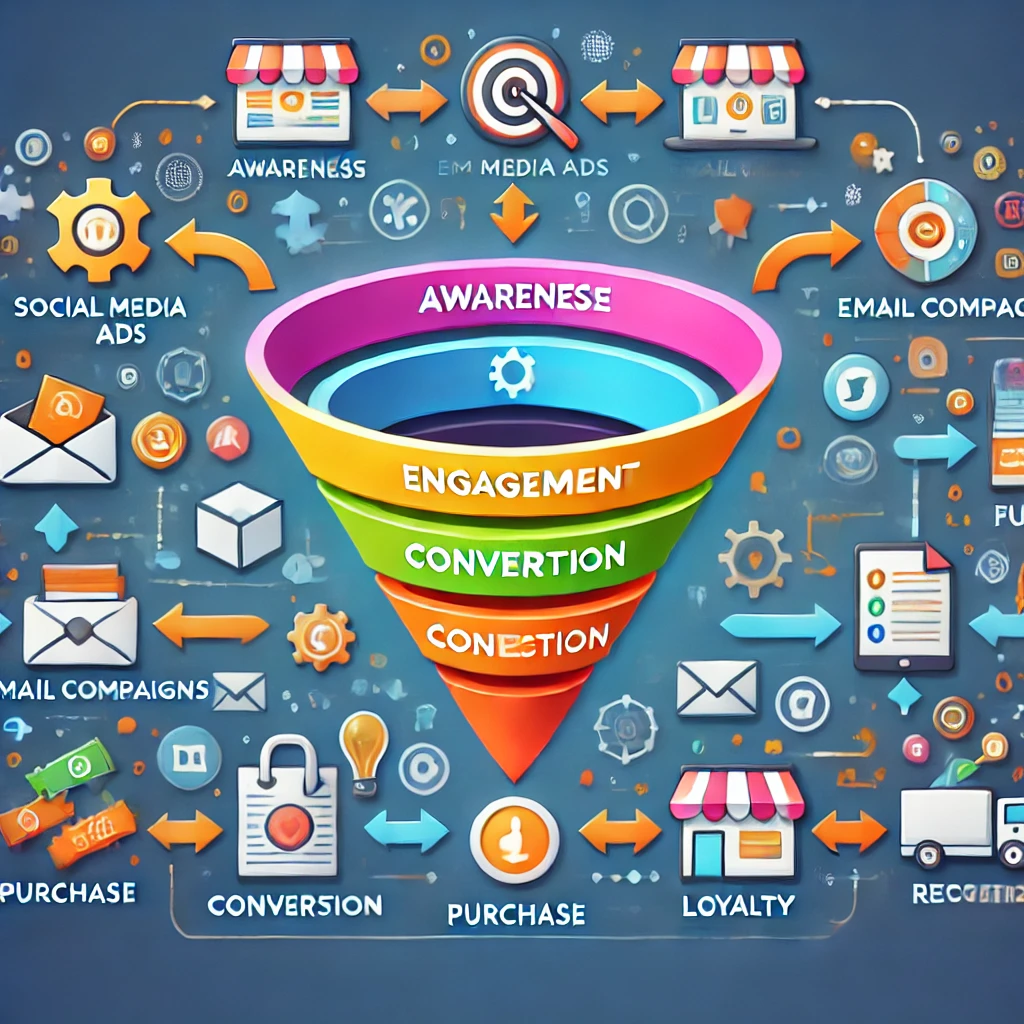Digital marketing is a rapidly evolving field, offering immense career opportunities. This comprehensive guide covers the full syllabus of a digital marketing course, ideal for beginners and professionals aiming to enhance their skills. It includes theoretical concepts, practical applications, and a breakdown of tools and techniques essential for digital marketing success .The Ultimate Guide to Digital Marketing Course Syllabus
Here is the complete Advance Digital Marketing Course Content Syllabus List
| Introduction of Digital Marketing | Traditional Marketing vs. Digital Marketing |
| Scope of Digital Marketing | What’s Inside in Digital Marketing |
| Top 5 Digital Marketing Strategies | Meet the Digital Marketing Fly Wheel |
| Techniques of Digital Marketing | 300 Ultimate Digital Marketing Glossary |
| Content Marketing | Types of Content Marketing |
| Objectives of content marketing | The impotence of Graphic Design in Digital Marketing |
| Learn Canva tool | What domain? |
| What is hosting? | How did the server work? |
| Word press website creation (For Practical Implementation) | Website silo structure |
| How to create a buyer’s persona? | Introduction of social media |
| Social media funnel | Introduction of each social media platform |
| Start with Facebook, Page Creation, Setting of a Facebook fan page | Group Creation & Joining |
| Facebook Ads manager introduction | Explain all objectives & campaigns with practical training |
| Brand Awareness | Lead Generation |
| Split Test | Remarketing |
| Social Media Automation | |
| Social Media Strategies | Introduction of Google ads |
| Google ads tool dashboard creation | Introduction of Search network, display network, Video network, Shopping ads |
| Introduction of keyword planner tool | Learn Search Network with Practical Implementation |
| Learn Ad extension | Remarketing |
| Conversion Tracking | Learn Display Network |
| Learn Video Network | Learn App Promotion |
| Google ads Certification Exam | Email Marketing |
| SEO introduction | Google Algorithms |
| Keyword Research, Competitors keyword research | Basic on-page factors & implementation of all 6 factors on the website |
| Introduction advance on-page factors, start meta tags & implementation | Sitemap Creation |
| Robots.txt file creation | Canonical Tag implementation |
| Redirection | SSL certification |
| Website speed | SEO Off Page Introduction |
| Link Building Activities, Referring Domain | DA, PA, Spam Score |
| Off-Page activities with Practical Implementation | Google webmaster tool set up & Implementation |
| Google Analytics Tool setup & Implementation | Local SEO |
| Things Not to do in SEO | Lead Generation |
| Online Reputation Management | Growth Hacking |
| Affiliate Marketing | Google Tag Manager |
| Internet Marketing Strategies | Freelancing Projects |
| Digital Marketing Interview Questions & Answers | How to earn from blogging? |
| Personality Development & Soft Skills Training | Resume Building |
Core Topics in Digital Marketing Course Syllabus
Always remember one thing, the digital marketing courses syllabus may vary according to the institute or organization which you are going to opt, but there will be some certain core topics that every digital marketing institute or college would be covered. Here is the list of core digital marketing course syllabus which you need to check before finalizing any institute.
| Introduction of Digital Marketing |
| Introduction of Marketing |
| Website Creation |
| SEO – Search Engine Optimization |
| SMO – Social Media Optimization |
| SMM – Social Media Marketing |
| SEM – Search Engine marketing |
| Affiliate Marketing |
| Online Reputation Management |
| Google Analytics Tool |
| Google webmaster tool |
| Digital Marketing Strategies for Small & Big Business |
| Market Research & Analysis |
| Content Marketing |
| Mobile Marketing |
| Digital Marketing Budgeting, Planning, Forecasting |
| Competitor Analysis |
1. Introduction to Digital Marketing
What is Digital Marketing?
Digital marketing involves promoting products or services using online platforms. It includes various methods like SEO, social media, and email campaigns to reach a target audience. The Ultimate Guide to Digital Marketing Course Syllabus
Why Learn Digital Marketing?
- High demand for skilled professionals.
- Diverse career opportunities.
- Cost-effective and measurable marketing techniques.
| Traditional Marketing | Digital Marketing |
|---|---|
| Expensive | Cost-effective |
| Limited reach | Global reach |
| Difficult to measure | Real-time analytics |
2. Search Engine Optimization (SEO)
SEO focuses on optimizing a website to rank higher in search engine results.
Key Topics Covered:
- On-Page SEO: Keyword research, meta tags, and internal linking.
- Off-Page SEO: Backlinks, guest blogging, and social signals.
- Technical SEO: Sitemap, robots.txt, and page speed optimization.
Diagram: SEO Process Flow
(Include a flowchart showing on-page, off-page, and technical SEO processes.)

SEO Tools:
- Google Keyword Planner
- SEMrush
- Ahrefs
3. Search Engine Marketing (SEM)
SEM involves paid advertising on search engines like Google Ads.
Topics Covered:
- Keyword Bidding
- Campaign Creation and Management
- PPC (Pay-Per-Click) Models
| SEO | SEM |
|---|---|
| Free traffic | Paid traffic |
| Long-term results | Immediate results |
| Organic growth | Budget-dependent |
4. Social Media Marketing (SMM)
Platforms Covered:
- Facebook, Instagram, Twitter, LinkedIn, YouTube, and Pinterest.
Key Modules:
- Creating Social Media Strategies
- Paid Campaigns (e.g., Facebook Ads)
- Engagement and Community Building
Chart: Social Media Platform User Statistics
(Include a bar graph comparing active users across different platforms.)

5. Content Marketing
Content marketing involves creating valuable content to attract and retain a target audience.
Topics Covered:
- Blog Writing and Optimization
- Video Marketing
- Infographics and Visual Content
Table: Types of Content and Their Uses
| Type of Content | Purpose | Example |
|---|---|---|
| Blogs | Educate and inform | How-to guides |
| Videos | Engage and entertain | Product demonstrations |
| Infographics | Simplify complex data | Statistics visualizations |
6. Email Marketing
Email marketing is a powerful tool for personalized communication with customers.
Key Topics:
- Email List Building
- Campaign Automation
- A/B Testing and Analytics
Image: Email Marketing Funnel
(Add a diagram showing the email marketing funnel: Awareness → Engagement → Conversion.)

7. Web Analytics
Web analytics help measure the effectiveness of your digital marketing efforts.
Tools Covered:
- Google Analytics
- Heatmaps (e.g., Hotjar)
- Conversion Tracking
| Metric | Definition |
|---|---|
| Bounce Rate | Percentage of visitors leaving after one page |
| Conversion Rate | Percentage of visitors completing a goal |
8. Affiliate Marketing
Affiliate marketing allows businesses to partner with affiliates to drive sales.
Key Concepts:
- Finding Affiliate Networks
- Affiliate Tracking Systems
- Performance Analysis
9. Mobile Marketing
Mobile marketing focuses on engaging users through their smartphones.
Topics:
- App Marketing
- SMS Campaigns
- Mobile Advertising
Chart: Mobile vs. Desktop Usage Statistics
(Include a pie chart illustrating the percentage of mobile and desktop traffic globally.)
10. E-commerce Marketing
E-commerce marketing drives traffic and sales to online stores.
Modules Covered:
- Setting Up an Online Store
- Product Listing Optimization
- Cart Abandonment Strategies
11. Tools and Technologies
| Tool | Purpose | Examples |
|---|---|---|
| SEO Tools | Optimize search rankings | SEMrush, Ahrefs, Moz |
| Social Media Tools | Schedule and analyze posts | Hootsuite, Buffer |
| Email Marketing Tools | Automate campaigns | Mailchimp, Constant Contact |
12. Digital Marketing Strategy and Case Studies
Developing a Strategy:
- Identifying Target Audience
- Budget Allocation
- Measuring ROI
Case Studies:
- Successful Campaigns (e.g., Nike’s Social Media Strategy)
- Lessons from Failures
- https://www.rebootonline.com/
- https://vanshika.digital/
13. Conclusion
Mastering digital marketing requires understanding diverse strategies and tools. With a strong foundation in the syllabus outlined above, you’ll be equipped to tackle real-world challenges and achieve measurable results.
Next Steps:
- Enroll in a reputable course.
- Practice using digital marketing tools.
- Stay updated with industry trends.
